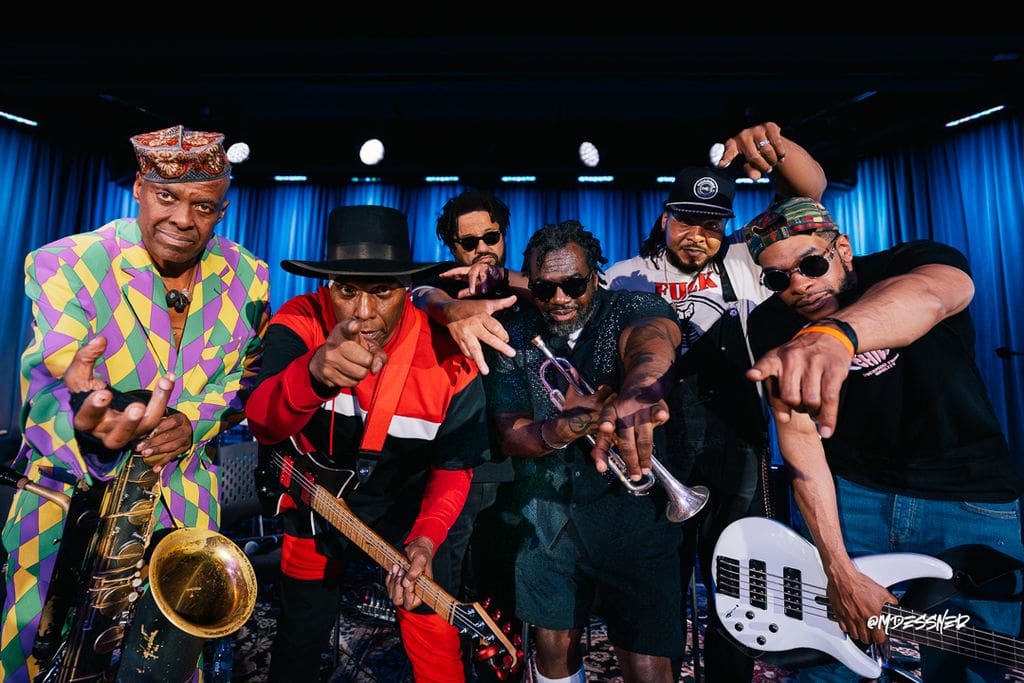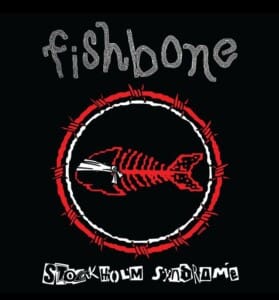
A lot of things can happen to a ‘90s band. Some make a phenomenal debut record and disappear, a few stay together for the long haul, and others break up before Y2k came. None had the same experience as ska-punk icons, Fishbone.
Formed in Los Angeles over 40 years ago, the original lineup has varied numerous times, and is almost unrecognizable today. While the lineup has changed, the sound has stayed rooted in ska with lyrical themes of politics and social structure. Their new album, Stockholm Syndrome, features plenty of commentary on the current state of America — the lead single is titled “Racist Piece of Shit.”
One of the only original members playing with Fishbone today is Chris Dowd, who lends vocals and is a master of the trombone and keys. Chris may be a member currently, but from 1994 to 2018, he took a break from the band to focus on solo projects and producing opportunities.
Now, Chris is back with Fishbone, touring a new album with Less Than Jake, and ready to talk about the current state of the band, and more importantly, the current state of the world.
(This interview has been edited for length and clarity.)
Fishbone is touring nonstop this summer to celebrate the release of the new album. How has the tour been going with the new live lineup?
I feel so fortunate. Angelo [Moore] and I got together to pick this lineup, and it was all about chemistry. If you don’t have chemistry, and you don’t have any sort of respect and trust for each other, you don’t have a good band. You need to respect the people in a band, not only creatively but also as a person. I feel like we’ve reached that level of chemistry, which feels really cool.
You’ve played with a few variations of Fishbone over the years. When you get on stage now, does it feel the same as playing in the ‘90s?
That is such a tricky question to answer. When we selected the band, I didn’t want to compare it to the past because everyone has different influences and will interpret our work differently.
I end up being like Donald Fagan [of Steely Dan]. I get very particular about how we play and make sure it sounds right. I want us to flow, like tai chi.
When I left Fishbone in the ‘90s, I played with other people and learned that some people can bring out the best in your playing, and some people can just be super flat. Before I came back to the band, I was offered to play with Sublime, and it didn’t work. I’ll just say that I didn’t feel very prepared. I didn’t fit in, energetically speaking.
So, once you returned to the band, the vibe was there?
Definitely, I could write half of Stockholm Syndrome and be completely invested in that sound going forward. I could stay in that creative realm going forward–it felt natural and like my home.
There are very few guys that I jam with musically and bring out my best. When I left the band, I moved to New York, and my friend, Hod David, and I worked on music together, and that really felt like chemistry. We produced a bunch of records together. My friend David Ryan Harris is another good example of somebody I vibe with musically. I immediately vibed with Corey Glover from Living Color and Jerry Cantrell from Alice In Chains. Jeff Buckley, too, of course, who was my best friend.
Let’s get into this new album and new lineup a little bit. You mentioned George Clinton, who helped make “Last Call In America.” What was it like working with the legend?
So here’s a weird, fun fact. When Fishbone made The Reality of My Surroundings, I lived in a loft with Jeff Buckley and my friend Amp Fiddler, who played with Parliament Funkadelic. I was introduced to George then, so I have known him since I was 17.
We also crossed paths in that era because his son, Tracy, happened to ride the same bus route as us. Tracy became a friend and would come to our rehearsals after school, and we became close with George at that point. This was when Funkadelic was labeled The P Funk All Stars, and they were playing with Dennis Chambers.
Making the song with George must have been a full-circle moment.
It was a very precarious time because we were just trying to find our footing with the new lineup. It still feels very strange how things have turned out with the band. Obviously, things didn’t go the way I hoped, but at the same time, you reach a certain point where you’ve exhausted all your creative and emotional output.
That’s kind of what Stockholm Syndrome is a result of. It’s very emotional and has some spiritual growth aspects for me as a human being. However, I have to balance the emotional aspect with the political climate. This record has a lot of emotional, social, and political interplay.
Definitely. You can really hear the political aspects of “Racist Piece of Shit” and “Secret Police.”
100%. I have a question: What’s your favorite tune on the record?
I do love the one with Clinton. “Racist Piece of Shit” is great, and “Love is Love” is a sweet tune.
So you like the shit I wrote, great, I appreciate that. I am always curious about what’s moving people–it’s my type of validation. Well, I’m gonna grab myself a coffee—great chopping it up with you, man.


